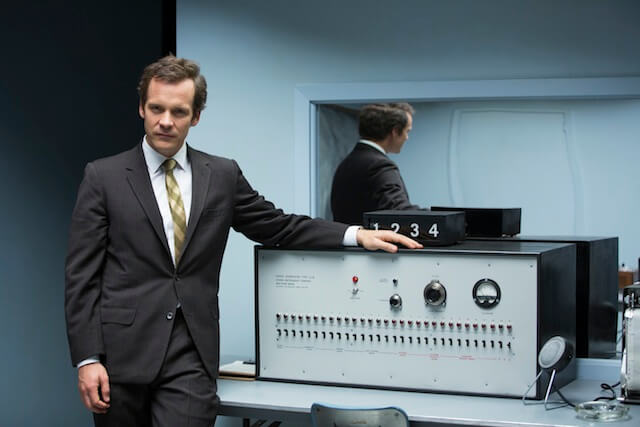‘Experimenter’ “Steve Jobs” has been hyped for its minimalist approach to the biopic, covering a whopping three events in the Apple icon’s career. “Experimenter” tackles just about all of (in)famous social psychologist Stanley Milgram’s career, but it’s even more experimental, even more playful and — with 30 less minutes yet — even more lousy with ideas. Played by Peter Sarsgaard with a coldness that oozes both venality and charisma, Milgram first made a splash with what later became colloquially known as the “Milgram experiment.” In it, he asked average people to take part in a learning experiment that was secretly a test of their obedience to follow orders, no matter how inhumane. Later experiments would expand on this theme, making him both a name and a pinata for those who found his methods, which involved lying to his human guinea pigs, unethical. RELATED: Winona Ryder sets the record straight while talking about “Experimenter” Director Michael Almereyda (the art-vampire opus “Nadja,” the witty Ethan Hawke “Hamlet”) doesn’t let slip where he stands, though engaging in the debate, or even exploring the baseness of human nature, is something his film is only interested in as much as it plays into its other, many ideas. (You’ll have to note for yourself, for instance, that Richard Zimbardo, of the Stanford Prison Experiment, mostly avoided this charge by telling his subjects exactly what they were doing, then watching as they went far and above what he imagined anyway.) There’s no overriding concept, but a key one is how Milgram, like all of us, had a blinkered view of himself, a way of justifying his actions, much as his ostensibly decent subjects did. The entire film is designed to project how he sees himself and his work. He talks to the camera. In fact he brags to the camera. Everything is artificial, including occasional cuts to obvious rear-screen projection as characters drive. There’s even an actual elephant in a room, making jokily literal the old concept of the elephant in the room. Milgram never quite gets outside of himself, never realizes that, even if his experiments got results, they were at the least ethically dodgy. His life becomes a narrow, sometimes absurdist fantasy — a life spent in lab rooms and on college campuses. Eventually Milgram finds himself talking to William Shatner (Kellan Lutz, one of many sometimes amusingly random surprise cameos), who is playing him in a mostly anti-Milgram 1975 TV movie opposite Ossie Davis (Dennis Haysbert). (Life, as they say, is stranger than weirdo art films.) His career even resembles that of a rock star: a big, splashy debut overshadows the subsequent works, which are mostly for the die-hards. These include his noted but not as contested (and therefore not as sexy) “small world” and “lost letter” experiments, which had only tangential connections to his greatest hit. Almereyda doesn’t cram us exclusively inside Milgram’s head, and he remains a tantalizing enigma. (Sarsgaard hasn’t been this razor sharp since “Shattered Glass,” which is saying something.) It’s a dialogue between a dispassionate, one could say scientific filmmaker and his subject, who never comes close to being a mere movie asshole. Almereyda allows the film to stop dead so Milgram’s work can be knocked down a peg or two, but also so he can be made to seem almost recognizably human. The first half hour is dedicated to the original obediency tests, some of whom go along with it, some of whom rebel, especially when they find out the shlub (a great Jim Gaffigan) they’ve been led to think they’re jolting with electrical zaps is actually an actor with a reel of pre-recorded screams. The presence of a devoted and not long-suffering wife (a quietly strong Winona Ryder), meanwhile, helps fill him in as a person outside of his work, teasing at a world beyond the film’s tight confines. “Experimenter” may be rigidly constructed, but it’s a wide open space for ideas and disarming moments of humor. It may seem as cold as Milgram, but it delights in surprising the viewer, right up to its odd, mysterious and perfectly judged final moment.
Director: Michael Almereyda
Stars: Peter Sarsgaard, Winona Ryder
Rating: R
5 (out of 5) Globes
‘Experimenter’ is a biopic even more playful and dense than ‘Steve Jobs’

Magnolia Pictures
Follow Matt Prigge on Twitter @mattprigge


















